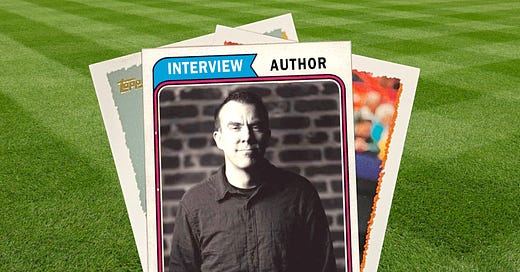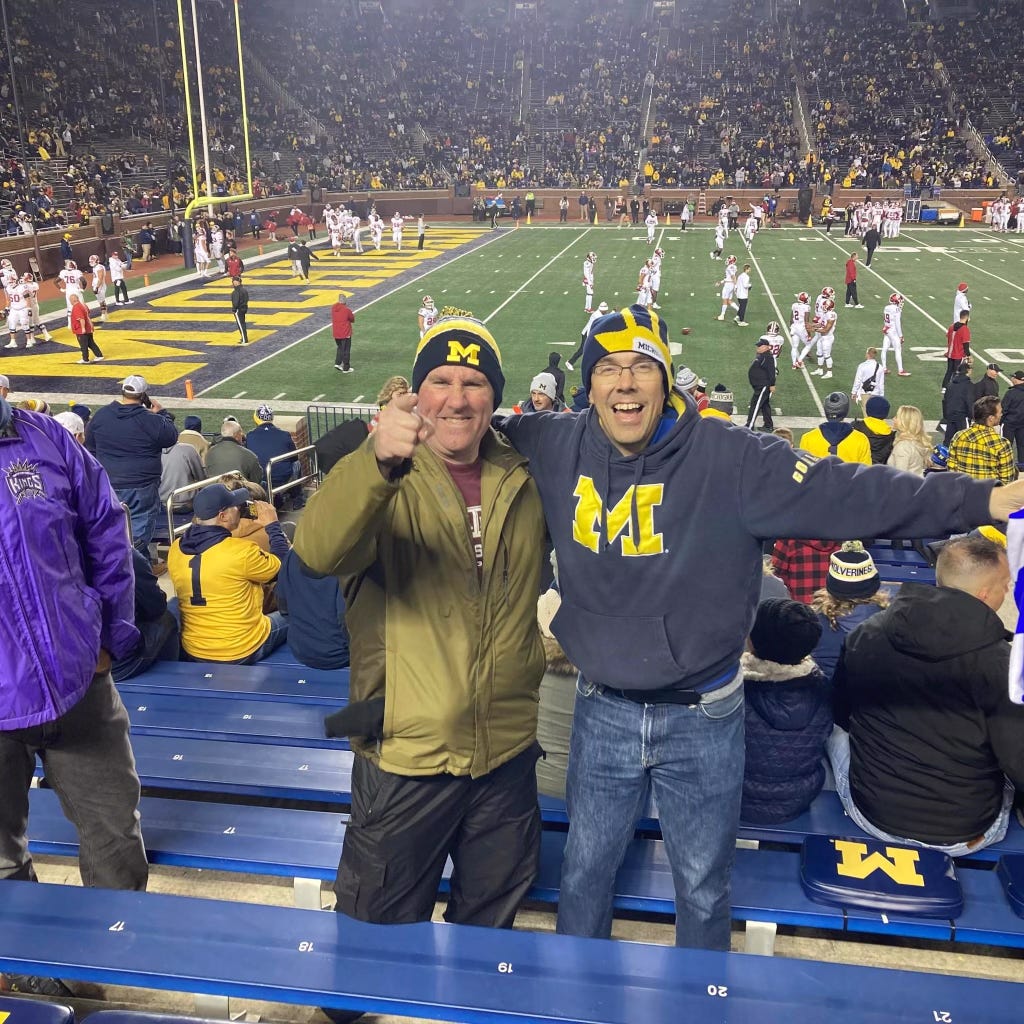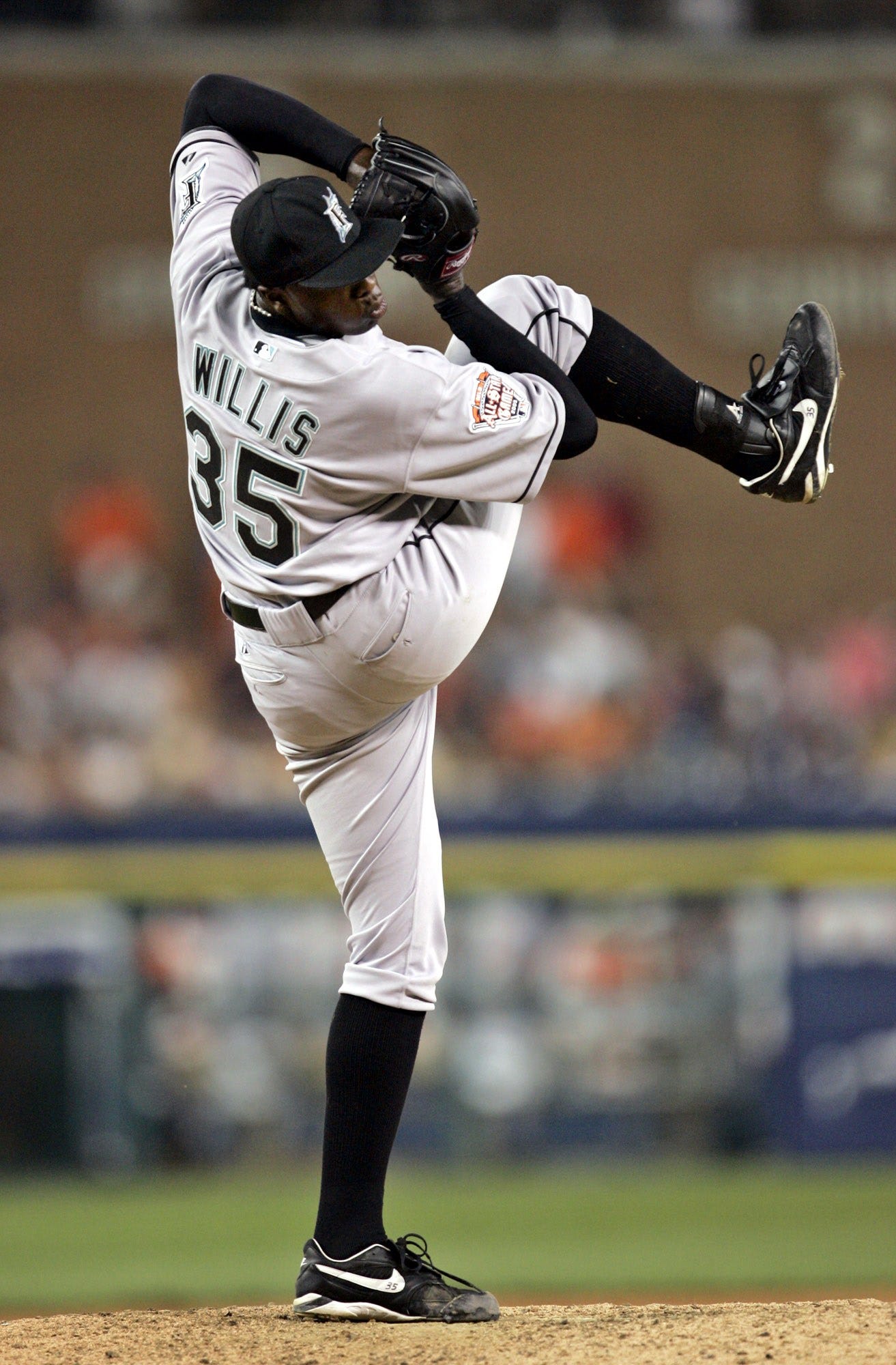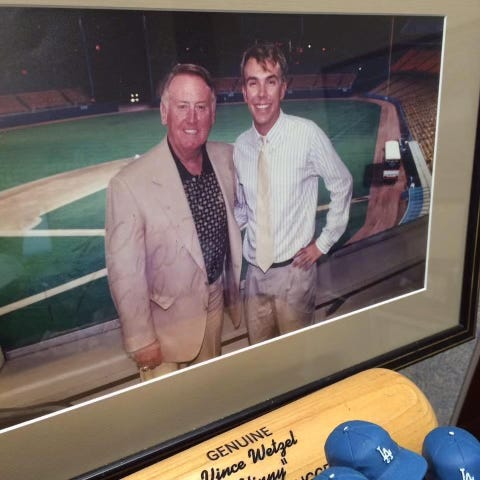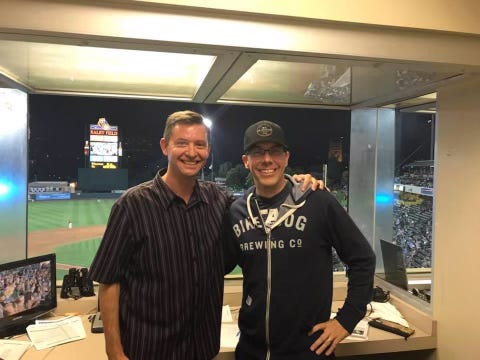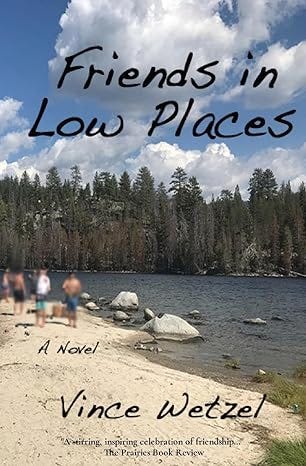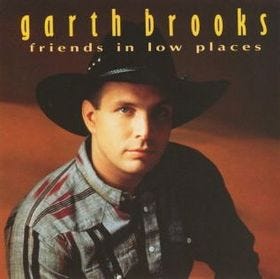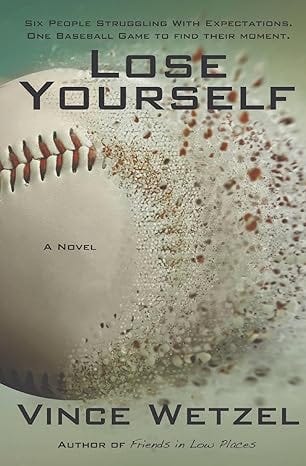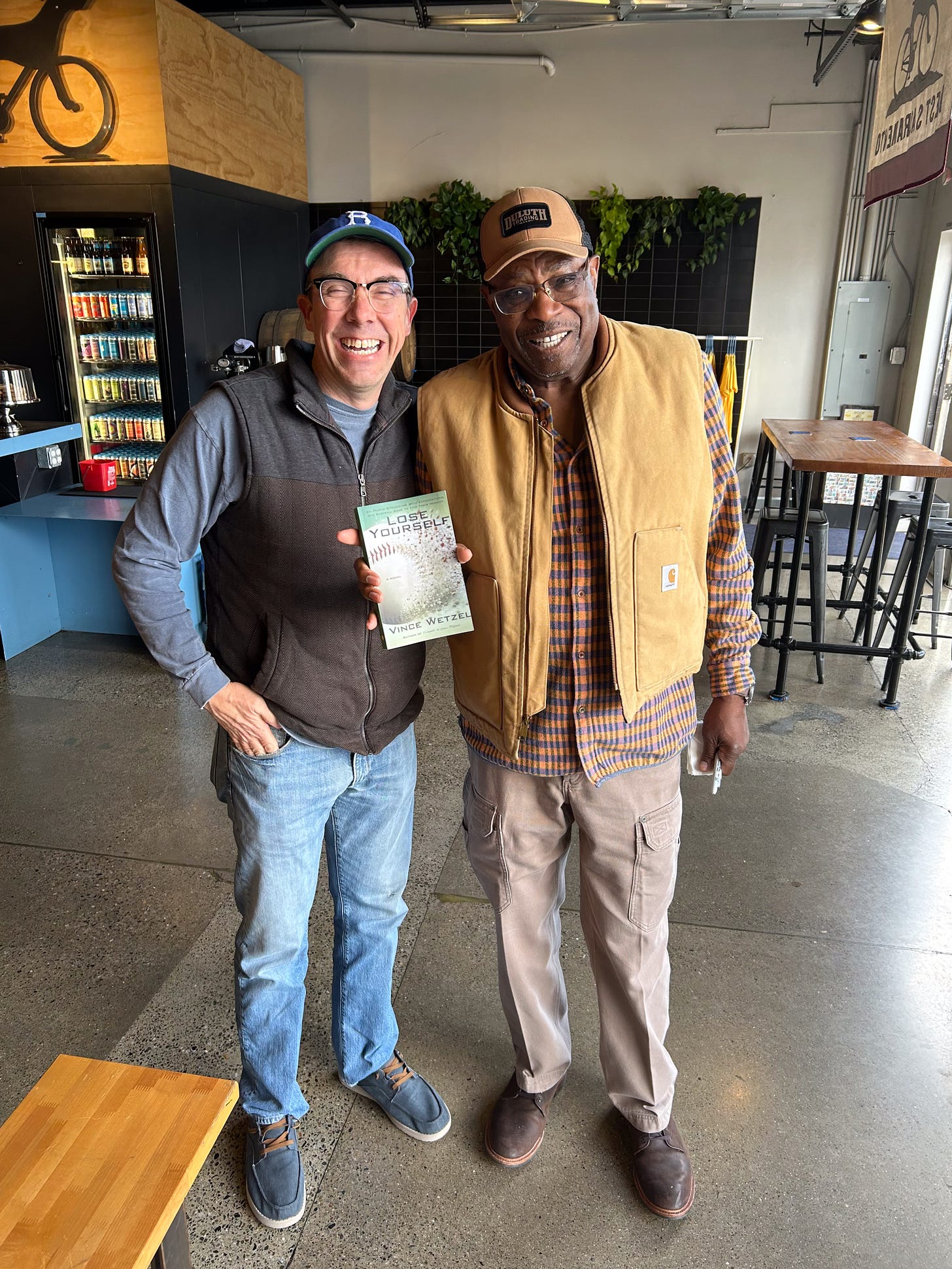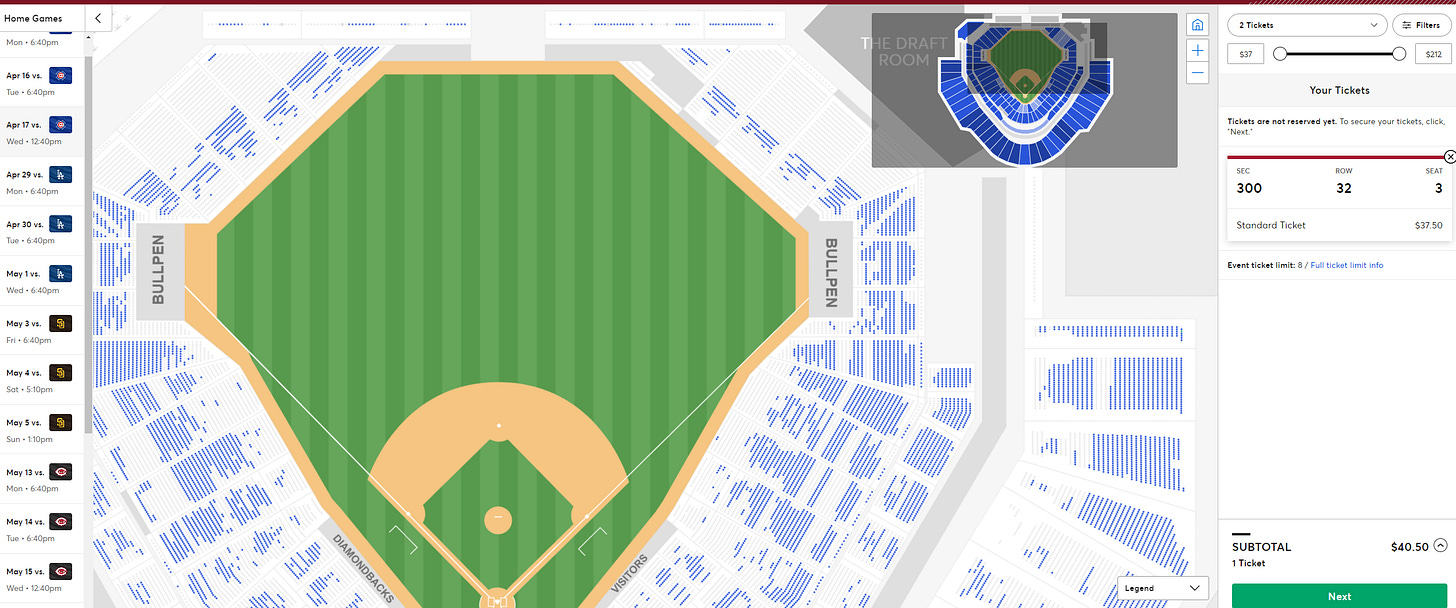Intro
Vince Wetzel is a sports journalist-turned-government relations rep who never lost his passion for writing. He published his first book, Friends in Low Places, in 2021. His newest book, Lose Yourself, published in April of 2024, involves several different stories told against the backdrop of a baseball game.
It turns out he was in the East Bay covering prep sports about the same time I was in high school. He was there from 1998 to 2001. I attended Monte Vista (sometimes) from 2000 to 2004. His wife’s first teaching job was at Monte Vista as an English teacher. Sure enough, Mrs. Wetzel is right there in my freshman and sophomore yearbooks. But my English teachers were Ms. Beavers and… I can’t remember the teacher I had sophomore year. Sorry Mrs. (blank).
He had a cool career in sports before the realities of a sportswriter’s salary moved him to a more stable field. Getting to work in the Dodgers front office as an intern in 1995 during Nomo-mania and covering the 1998 Rose Bowl between Michigan and Washington State that featured Heisman Trophy winner Charles Woodson and infamous former NFL QB Ryan Leaf are a couple of the thing he got to witness.
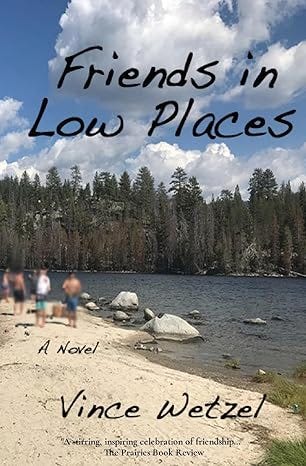
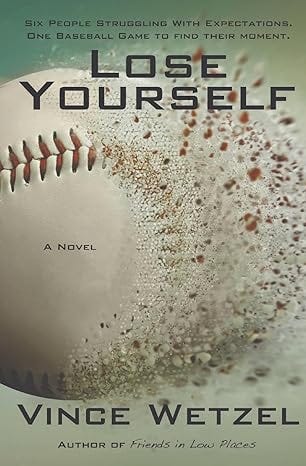
His books can be found here:
Friends in Low Places (Amazon link): Jim organized their annual guys trip to the lake. He picked the date. He booked the spot. He even chronicled every adventure over the past 20 years in a ragged notebook. Now, he is a box of ashes that his four closest friends will take up to the lake one last time. Over the course of their final weekend together, they will read Jim's journal through his eyes, reliving their shared laughter, life moments, revelations, and regret while coming to accept their grief.
Friends in Low Places is a funny, poignant, sometimes heartbreaking portrayal of male relationships and the support they provide as boys mature into men.Lose Yourself (Amazon link): It’s the final game of the season
All-Star Brett Austen has a chance to secure the first .400 batting average for a season in more than 80 years. However, increasing pressure and his own hubris threaten the apex of his career.
Meanwhile...A sideline reporter wrestles with a choice between her career and her mom in crisis.
A retiring usher takes in his final game before moving in with his son’s family.
A lanky 15-year-old can’t understand his future stepdad while pining for a girl from school.
A lemonade vendor agonizes over a big score to settle gambling debts and fulfill his daughter’s dreams.
An adult daughter navigates uncomfortable family dynamics at home while her father lies in hospice.
Will their choices meet the moment?
You can also check out and subscribe to his own Substack here:
Sports Journalism
Are you from Sacramento?
Originally from Bakersfield, went to school in Southern California. Worked as a sports writer in the Bay Area out of Pleasanton. It was the Tri-Valley Herald/Oakland Tribune, the ANG newspaper group.
I delivered their papers once back in college. When were you a sportswriter there?
I was there ‘98 to 2000. And then I realized I can't make any money being a sportswriter, so I left. I did mostly prep, so I covered the East Bay Athletic League (EBAL). So I covered Amador Valley and Foothill, Livermore, Cal High...
Monte Vista?
My wife taught English at Monte Vista from ‘99 to 2001. That was her first teaching job. So you were at Monte Vista, probably there in 2000, it was Mateo Miramontes and Dontrelle Willis were pitching against each other and there were scouts from every dang professional baseball team there, all with radar guns. It was pretty crazy.
I was there from 2000 to ‘04. So our football team was big for that period, but the baseball team not so much.
Did you go to school for journalism?
Yep, and broadcast journalism. I originally wanted to be on ESPN. But then you get out of school and you go, oh, I need to send clips out, or I need to send tapes out. Tapes cost $5 apiece. Clips cost a quarter, so that made the decision for me.
What was your first job after school?
I went to the Antelope Valley Press and was the prep editor there and covered high schools in in Lancaster, CA. They covered high schools like most cover like the pros. So I had like 3 stories a day, I was writing like crazy. But I also got to cover some Dodger stuff, some college stuff. I got to cover the ‘98 Rose Bowl, Michigan versus Washington State Rose Bowl. That was a lot of fun.
Then I went to Oakland, the East Bay. And then I went into PR, did high-tech PR right at the time the dot-com bubble was expanding… and then bursting. Then I got a job doing PR work for a disability rights advocacy organization in Sacramento and was there for 4.5 years, moved to Sacramento. And then in 2006, I got a job with State Farm doing government relations stuff and I've been there for 18 years.
So why did you leave journalism? Was it wanting to cover bigger things or was it the money?
It was mostly like, my wife was a teacher and I was a sportswriter. So a sportswriter’s life is 3pm to midnight. A teacher's life is 7am to 3pm. So something had to give and also, you can't make money. I'll be quite honest with you, I don't know if I was… there's only so much you can do in sportswriting without having really exceptional talent and exceptional interview and reporting skills. I think at that time you find yourself going, what am I in this for? And at that time, I was like, I'd rather try to work on something where I can have a family. I wasn't like the passionate, no, I'm doing this no matter what, and I feel really passionately about this to keep at it. I wasn't in that space, so it was a good time for me to leave the biz.
But you were passionate about it until that point. What changed?
You get married and your life kind of reevaluates itself and I understood what my priorities were. And the sportswriting stuff didn't hit high on the priority list, so.
How did being a fan change while you were in sports journalism?
As journalists, we’re not supposed to be fans of the game. I did cover the Dodgers when I was at the Antelope Valley Press in Lancaster, but I had enough professional scruples not to be rooting for the team. I played it fair. I remember I interviewed a closer who blew like his third or fourth game in about a week and I asked him a question, by myself, and he yelled at me and he goes, ‘I blew it, OK! I blew it’. Well, I have to ask the question, sir. I tried to be as fair as I could and that sometimes pointed out that, hey, you blew your fourth save in a week.
What was the hardest part about being a journalist for you?
I like reporting on the games. I don't have a lot of misgivings about asking about the game itself and performance within the game. But as you know, sportswriting is, especially over the last 25, 30 years, it still is about the business of the game, the players’ personal side of the game. I didn't feel comfortable asking those type of questions and that was really hard for me to get into that mindset to ask those questions.
Was that a personal thing or was it you needed more guidance on how to ask those questions in a tactful way?
I think it was personal ‘cause I'm more of a hey, you do what you gotta do in your own space, that it's not my place to judge you on that kind of thing.
So you're not a TMZ guy.
First, I missed Mateo Miramontes by one year, so I did not know who he was. He was a pitcher for Monte Vista when they won the North Coast Section Championship in 1998, went to University of Nevada Reno, drafted by the Mets in the 6th round in 2003 but never made the majors. He’s now actually the head baseball coach at Monte Vista High School as of 2020. Dontrelle Willis, well everyone knows him by now, was a Rookie of the Year, 2003 World Series winner with the Marlins and a two-time All-star out of Encinal High in Alameda, CA.
As for the sports journalism career, sounds like he made the right decision. For every journalist who has a 50-year career and winds up getting lots of TV time on ESPN, there’s dozens who end up covering prep beats at small-town papers and eventually move on to other careers to support their families. It is just how the sports industry as a whole seems to work. Minor league players rarely make the majors, but they all start out willing to play in single-A, dimly lit ballparks chasing the dream. Front office interns put up with 12-hour-plus gamedays and thankless menial tasks and low pay for the chance at rising the ladder or getting a promotion at another team. And journalists, whether newspaper writers or local TV anchors, often clear out to different careers and get replaced by other cheap, bright-eyed grads. But you’ll see that this experience was an immense help for Vince’s writing pursuits later on.
Being a Baseball Fan and Dodgers Memories
What’s your favorite baseball memory?
I was an intern with the Dodgers in ‘95.
Is that your team?
Yeah. I was going to school near there, (University of) La Verne (30 miles east of Dodger Stadium). Some of my favorite memories were working in the clubhouse and working in the press box. I have a very specific memory of me and Vin Scully in the bathroom in the press box washing hands next to each other. And he said, ‘So how do ya like the game?’ I was like, ‘It's great, sir.’ He goes, ‘It's a beautiful game,’ and finished up and went our separate ways. He went into his broadcast booth and I went to recording scores on a whiteboard. It was fun.
Do you like watching baseball regardless of level? You're in Sacramento with River Cats games (triple-A team for the Giants. Update: Also the future temporary home of an actual MLB team)
I have gone to a lot of River Cats games, but I'm not as interested in the outcome and every pitch. It's more of a place to be and hang out. As I said, I was a high school sportswriter. I watched a lot of really bad high school baseball, a lot of really bad Pony baseball, a lot of bad Little League baseball. It gets to you. You go, ‘Oh my God, can they just throw the ball over the plate please.’
Growing up were you a huge baseball fan?
I really loved football and basketball. In Bakersfield, high school and college sports were king there too. I was more into football and basketball in grade school and in high school. I followed baseball, but we were 2.5 hours from Dodger Stadium. That's an investment to get down there, go to the game, and then come back up. We'd go to a game a year and then at that time maybe one or two games a month (were on tv), there wasn't as much exposure to it when I was growing up. In college, I was close to Dodger Stadium. And then of course, the internship was a lot of fun.
So that internship ignited your passion for baseball?
Yeah. That was Hideo Nomo's rookie year. The year before, Raul Mondesi was Rookie of the Year. Before that, Piazza was Rookie of the Year and the year before that, Eric Karros was Rookie of the Year. Tommy Lasorda was still the manager. Peter O'Malley was still the owner. So it still had that kind of pristine O'Malley image of a hometown type of owner, not a corporate owner like they are today. So it was really cool. I mean, I would walk in to deliver clips to Mr. O'Malley himself, you know? I mean, that's wild. Just walk in and say, here's your clips today, sir.
Any specific memories from that internship?
That was also the scab year. The strike was the year before. There was a truncated spring training and also the ‘95 season was shortened to 144 games. I remember Mike Busch was a scab player that then got called up to the Major Leaguer. Brett Butler famously froze him out and he was a pariah in that clubhouse and you kind of felt bad, but you also understood what was going on. I remember some of those days where he left the clubhouse and went to another part of the parking lot and got into his car and left that was that was kind of crazy.
And then Lasorda is just, I mean Lasorda stories… you haven't lived until you've been cursed out by Lasorda. And so I brought the stats to his office late because the printer broke down and he wasn't happy with that. I mean, he expressed profane like an art form. So I got to experience his performing art.
(note: here’s a famous example of a legendary Lasorda rant)
And what was it like being on the receiving end of that performance?
I'm not going to make an excuse. I'm just an intern. I'm just gonna sit here and I'm gonna take it. You're in front of a legend, and so you kind of just go, who else gets to be cursed out by Tommy Lasorda? This is kinda cool. I mean, I wasn't smiling and going, yeah, this is awesome! I was taking it and I was a little upset, but you look back and you go, hey, that's just something I'll remember forever.
And then I remember he had Don Rickles would be just sitting on his couch before a game. And then one time Pee Wee Reese was just sitting on his couch in his office. I mean, there would be just these legends that would be just hanging out right before a game. The Dodger experience was kind of fun that way, all those legends would always be coming around and checking out things.
It was true, the Dodgers were Rookie of the Year machines in the mid-90’s. From 1992 to 1996, they had five consecutive rookies win: Eric Karros, Mike Piazza, Raul Mondesi, Hideo Nomo, Todd Hollandsworth.
I probably would’ve peed my pants if I was getting dressed down by Tommy Lasorda as a 19-year-old intern, though.
Writing the first book and then the second book
What was the first book?
The first book is called Friends in Low Places. It's about-
Garth Brooks?
It’s a group of five friends who go on this annual camping trip up to the mountains above Fresno. The head of their group dies and then they take his ashes to spread at this lake. It alternates between present day and this diary of his, and they read through it. So you get to, through his eyes, you see their history from when they're 18 to 38 of just the shenanigans of, when they're 18, wanting to just drink beer and meet girls, through the process of meeting people, getting married, having kids, and just how their relationships stayed the same, but they also grew as people, as friends, as husbands, as fathers. You know, those friends dynamics that we all have. Trips that have great memories, sometimes you never want to tell them outside of your group and then just some of the campfire stories just talking stuff out.
So that was a personal book for you.
Yeah, exactly.
Did you expect it to lead to a second book?
Yes. I think once I got it done and I had some great feedback on it and it sold okay, I went, I can do this. Once I finished that one and was bringing it to publish, I was like, this was a great process. I enjoyed it. And so the baseball novel has always been kind of in the back of my head that I wanted to do, so I thought this would be a good space for me to try it. I've written like two or three half-baseball novels before. I would get like 100 pages in and then it’d just sputter and die. So this was my third attempt to try it, and this time I got it through.
OK, so you were in sports journalism and then you left. From then to now, for the first book, it was 15,16 years. So you had your family that kept you busy, so now that… are they out of the house?
I have one kid in the at the University of Utah. He's a junior there, and then my daughter is a senior in high school and she's going to college next year, so they're on their way out of the house.
Do you have a comparison of what it was like writing for newspapers as opposed to the book? They're two different worlds, so what was it like shifting to fiction?
The writing is totally different. Like, journalism, there are very strict rules on how you write, putting the facts up top, quotes are all direct quotes. Fiction, I can make up a quote and I don't have to worry about it. And I can interweave just how a story is and put a big AHA moment in the middle of the story. A twist. Whereas a journalism story, you put the most important thing first. In baseball nonfiction, you're addressing a premise, an aspect, whether it's a player profile or, a Moneyball, a concept type of book. There is a purpose, but it's all factual through interviews, through research. This novel was all in my head and some things were revealed after the second or third draft. It wasn't like the first draft was perfect.
There are six stories that are interweaving throughout this book. I wrote each story separately in the first draft. So I had a box score that this fictional game takes place. That was the basis for all six stories is like, OK, what's the ebbs and flows of the game and where are they going to be during different parts of the game. I wrote each story separately and I smushed them all together, and then sometimes in doing that I went ohh, this other story reveals itself or, this scene works well here. I'm going to make that happen. And you find yourself finding the story through the rewriting process and the revision process, and that's what happened here. A lot of reveals and revisions didn't even happen until I got a quarter, halfway through the whole editing process.
Why did you choose baseball for this? I could see why it would work best for this kind of story, but why did you choose it?
I think baseball provides a great narrative backdrop for really good drama. There is a pace to the game, there is a pace of inactivity to the game that allows for things to happen that are maybe not related to the game. When we go as friends to a game and you go sit in the stands, you're paying attention to the game, but you're also talking to your friend about, hey, what's going on in your life? There's opportunity for conversation. There's opportunity for other things to enter into your watching experience. I think it translates well to being a novel. You look at the great baseball novels, you got The Natural by Bernard Malamud, you've got Shoeless Joe by W.P. Kinsella which became Field of Dreams. You got For Love of the Game by Michael Shaara. So baseball has shown that it is a great literary game to portray.
So it's a fictional story but you had to have known a lot about baseball to make it work, right?
Well, yeah. As a sportswriter, having a whole season going to the ballpark every day. As an intern, you get immersed in the game and you get immersed in the different characters of game. And of course going to dozens and dozens of games over the years of sitting in the stands and rooting on teams, you capture and understand the game in a good way.
How much of that experience helped you with this latest book?
Knowing the clubhouse atmosphere, at least then, I think the clubhouse, there's some scenes early in the book before the game starts that I remember how the players would be getting ready, or like, Lasorda would come out and say, ‘Hey, can I talk to you,’ and then they’d go into his office and sit down and talk. And then the press obligations, too. It's much more intense now, from what I can understand, but at the same time, there was the press guy leading the players around going, okay, you got this obligation, this obligation to get to and the player would say, I still need to get in the cage. Well, you'll get there. So there is some of the inner workings of the clubhouse before the game from when I was there. I guess what I'm saying is the environment, you feel like you're there cause I'm bringing some of that atmosphere into it; there's a realistic vibe to it.
What was it about baseball that hooked you? You worked for a team, but to a lot of people that did internships, that's just a job.
I think it was everything. You had the historic figures coming through the clubhouse. Don Newcombe, legendary pitcher from the Jackie Robinson era, came around. Ron Cey was always around. Steve Garvey came around. So you see all these people, these athletes, these heroes from the past and they're just coming by the clubhouse and just hanging out, I mean, that was just amazing. And then the game itself, you just got to see the intricacies of the game. I remember one time it was baseball giveaway night, well, it was the last baseball giveaway night, because there was some bad calls and so then the baseballs started littering the field. They had to stop the game twice and I think at the end they called it.
So in the interim, between journalism and writing your first book, you said you got two books halfway finished, right? So you were always kind of trying to restart?
I wanted to try it out. I wanted to write a novel and have a real project. I've talked to a couple of people who want to write a book and I said the biggest thing is discipline. The first 50 pages, you write totally on adrenaline and the last 50 pages you write on momentum. But that middle 150 to 200, it's all discipline. It is a malaise, you have to just keep at it, if not every day, then you have to set a goal every week to hit or else you will not complete it ‘cause it is a slog to get through that middle part.
Do you think you would have taken that advice if somebody told you that for the first couple tries or were you just too busy?
I probably would have said, I could do it, but not have a plan to do it. I'm much more disciplined now than I was earlier than life. Kids have a way of teaching you discipline.
So when you finished your first one, what was the difference between that and not finishing the other ones?
I had a plan. I had a framework. So I knew that it was: the friends would go up, that they would spread the ashes, that they toast their friend, and that was kind of the end of the book. But I knew throughout they're gonna have these memories that get them there. And so I knew, OK, I gotta find a story for this journal entry, and I gotta find a story for this journal entry, And I gotta find a story for this journal entry. And then on the present-day stuff, these are some of the themes I want them to kind of talk through and get through processes of grief or whatever they need to get through. I knew where they needed to end up, so how do I get them there. Now that first one, novels are supposed to be between 80,000 and 100,000 words, 100,000 is the absolute max.
That first draft of Friends in Low Places was 170,000 words. So that was one thing I learned is like, Vince, no, no, no. You don't have to write like 10 pages about driving down Hwy. 99 in the middle of summer. You don't need to do that.
So it sounds like between that book and this book, maybe it helps that you have sections. So this one's six stories and you gradually tie them all together, right? And then the first one, the diary entries kind of are sections. That feels kind of more, I don't want to say formula driven, but you obviously had more structure, and that feels like something that a journalist would have been ingrained in them, right?
Yeah, that's a great point because one thing that I think has helped me in this fiction writing that I remember from journalism is that, you know, high school football night, you get done at 10pm. You're coming from Danville to Pleasanton, the game is over at 10, your deadline is at 10:30. And you have to still drive from Danville to Pleasanton, so you got 15 minutes to write 15 inches. So that's about 350 words.
So as I'm driving from Danville to Pleasanton, in my head I'm formulating this story. This is how I'm starting off, I'm going to talk about this, and this… So that by the time I got to the office to write my story, because we didn't have mobile devices to write them on, by the time I got to the office I had the structure ready, I had what I needed to write, and then I could just, I'd like to say keyboard vomit. I could just start writing and I’d just write. So I know with writing novels, I don't have a lot of trouble with writer’s block. I can just start writing. Now, some of it may be crap. I mean, a lot of it's crap. But I don't have any trouble just with a blank page, I can just start writing and eventually something will come out that's worthwhile.
What was your approach for the ones you didn’t finish?
I tried to be too ambitious, I think was one of the problems. So Friends in Low Places, there's flashbacks and stuff. And if you think about… I was trying to be like For Love of the Game, there's a lot of flashbacks in that movie with Kevin Costner, right? So I wanted to have this sportswriter/columnist Jim Murray-type and go from covering LA sports in the 60s and 70s to present day. There's a lot of research in it and I got really bogged down in the research and be historically accurate. So I think the weight of that was just too great for me to do. It's really hard to do that on your first novel when you don't know really what you're doing and then on top of this, you have all this research and all this historical accuracy trying to bog you down. And I think that that was too ambitious for a first foray into being a novel writer.
When he started telling me his writing process, I made notes of how much different it is than mine. I could tell that once it clicked that he would write these separate parts as almost separate articles, it all came together for him and he was able to weave these stories together into books. And then you think about what journalists have to do to get stories up, sometimes against a short deadline, they have to have so much already mapped out in their head that they can go right into putting it to paper with 80% of the work already laid out.
And then my “strategy” is just write it all and let God sort it out. Rough drafts annoyed me, I figured it was good to go on the first draft. In school, I always got A’s on my essays and tests and I always finished first. If someone turned it in before me, that’s when I felt I failed. But maybe eventually I’ll take the smarter approach of slowing myself down and choosing quality over expedience.
Also, the clubhouse culture is one-of-a-kind. Vince does a good job placing you in it in Lose Yourself. When I interned for the triple-A Portland Beavers, just before the start of a game I was sent into the clubhouse to grab a player to catch the first pitch. It was a full on party in there with mariachi music blaring on the stereo and everyone having a good time. Turns out, our catcher and his wife had just had a baby boy that morning so he was passing out tequila shots to celebrate. I declined, saying I was working. He said, “So am I! I’m catching tonight!” and downed a shot. I couldn’t say no after that, but I did chew a lot of gum and prayed no one would smell it…
The A’s 😞
Any thoughts about the soon-to-be-former Oakland A’s?
Yeah, it's really tough. I've gone to dozens and dozens and dozens of A’s games over the years. My family are A’s fans and so it's a really difficult situation. And I was contemplating you know, do I release this book with the A’s in Oakland, right? And in my book there's not even a mention of relocation or anything like this. I kind of was wondering, should I try to rewrite it and make it Giants, you know, does that work? But then I went, you know what, I wanna make this a celebration of the Coliseum culture and the A’s fan culture, because it's a different culture and a vibe than many other ballparks. It's almost like a college football atmosphere there when it's rocking.
I felt like writing this book and keeping it the A's, it's just like, let's celebrate what the Coliseum was in its heyday the camaraderie and the fun atmosphere that you got from going to an A’s game.
Where did you sit most often?
When we lived in the Bay Area, they still had dollar dogs and dollar ticket days. You know, a newlywed couple with not a lot of money, that was great date night. You park in the BART parking lot for free and then you walk across the bridge. You pay $2 for tickets and a couple more dollars for dogs. It's a $5 date on a Wednesday night. So usually right field, second deck. That's where those tickets were. But then, you know, if you kind of work the ushers right, you could sneak down into the lower bowl or you could go to the bleachers and hang out there if you want.
And then on weekends, memories of tailgating. Tailgate baseball is the best, right? Like there's not many places where you do tailgating for baseball. Having a couple pops and coming in, that was the best.
There it is again, more proof of baseball pricing out a big chunk of their fan base. Obviously, the A’s are an extreme example, but lots of teams had tickets for under $10 to get in (and no f***ing fees!) that are now obscenely priced. Then you think about people like Vince recalling his visits to the Coliseum and how much he enjoyed being at the game and has since provided his own contributions to the sport as a lifelong fan… What if those weekday summer tickets were $25 and $20 to park and $5.99 for the hot dog? You just eliminated a whole income level from being able to go multiple times. Like I want to go to the matinee game at Chase Field this Wednesday, the Businessman’s Special they used to call it. It’s a 12:40 start, kids are still in school, attendance will probably be in the low 20,000s.
This is their cheapest ticket:
Here’s the view from that remote mountaintop seat for $40.50:
Anyways…
Check out Vince’s books, especially if you’re a baseball fan, Lose Yourself is a fun read. I’m about a quarter through it so far. He’s also a huge Kings fan, here’s him before they lit the beam:

